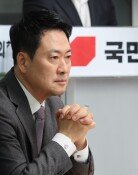[Column] S. Korean gov¡¯t needs self-exam
[Column] S. Korean gov¡¯t needs self-exam
Posted September. 15, 2000 16:10,
Many people keeping a close watch on the improvements in the inter-Korean relationship yet failing to truly grasp full understanding have begun to say that all the efforts of President Kim Dae-Jung have been aiming at the Nobel Prize for peace prize announcement in October.
It must be the result of frustration. Some feel that the president has pursued a personal goal-oriented course of events, which is difficult to understand. However, could we assume the president was that inept? Even should the things go well and the president does receive the Nobel Prize, it should be congratulated. However, it is difficult to deny that the dissatisfaction among some people reflects the distrust in politicians and the worries concerning the state of this nation.
The fact that successful diplomacy requires unity within the nation is common knowledge. From such a viewpoint, the current government's policies, both domestic and foreign, do contain a measure of worrisome details.
First, we must take a closer look at the government's effort toward securing the fundamental conditions to meet the pursuit of a market economy model. Without government first expanding and strengthening its services through a transparent and reasonable policy in order to manage a market economy, which centers around the freedom of industrial culture, not much can be expected. The foreign currency crisis, which was the biggest crisis since the Korean War, was not a simple problem of foreign currency but required a comprehensive revision of the government functions that had been the legacy of the national development phase.
However, it is too bad that such an issue has been run over by political logic and rationale, still lacking any clear direction.
Who would consider it a minor discomfort to be unable to eat the food on the table due to fear of poisoning. What is the cause of the medical crisis? The regional autonomous governments obtained through hunger strikes probably did not do so to watch so much of our environment destroyed.
How is the situation today? President Kim fully understands that the key to success in efficiently spending the public's money is by a democracy, but where does the government spend all the tax money?
With the administration leaning more toward obtaining authoritative benefits, it has neglected to address the improvement of the competitive economic edge of the Korean industry in the ever cut-throat competition of the international economy. If the current domestic policy by the government is pursued, even with the successful direction found for the inter-Korean relationship, it will be quite difficult to effectively utilize and handle the development.
As the inter-Korean issues have gained a great deal of interest worldwide, it is partially understandable that even a minor improvement, or even a ceremonious one, begets an incredible media attention and coverage. Even so, such successes cannot overcome or defuse the problems in other areas of Korea. For the greater goal of easing of tension between the two sides, many had to look at only the faces of the North's delegation without words, knowing well their faces bespoke some mockery to the state.
President Kim made a correct assessment that North Korea agreed to the summit as it failed in its pursuit of domination over the South through negotiations with the United States. It appears the North now is pursuing a control over the U.S. through the South. Such a shift in North Korean policy and the South¡¯s sunshine policy came together at an opportune moment. As a result, there seems to be a paradoxical development of South Korea being the beneficiary of the North's sunshine of patience.
Kim Jung-Il has proclaimed that he was a communist and that he derived his power not from the laborers but from the military. Another high-ranking governmental authority stated that the people are ruled through food dole. The armed forces in the North are the largest standing army in the world. No one can deny that the authoritarian system is a near perfect one with full backing and control of the military. To such a system, South Korea is only adding to their might by condition-free aid packages.
Although the criticism might be too early in coming for what President Kim has mentioned would take two or three decades, the South Korean government can not help unawaring of the North's goal, control over the U.S. through the South. Why the South Korean government is going along with this policy is unfathomable. It would be advisable for political circle to pay attention to the possibility of the gevernment playing an exorbitant game for a second term in office.




![“잠만 자면 입이 바싹바싹”…잠들기 전에 이것 체크해야 [알쓸톡]](https://dimg.donga.com/c/138/175/90/1/wps/NEWS/IMAGE/2026/02/23/133404749.3.jpg)


